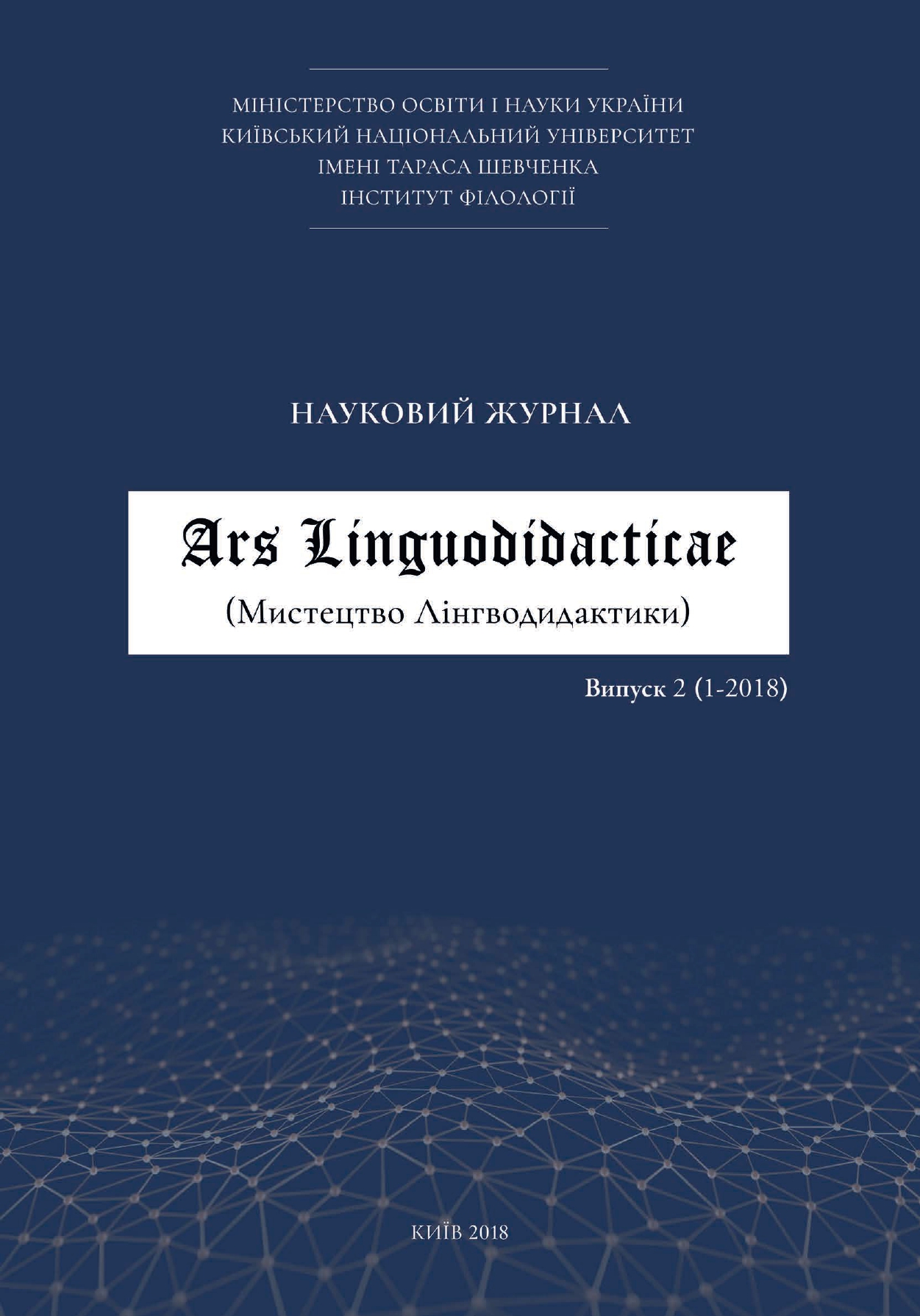TEACHING INTERCULTURAL COMMUNICATIVE COMPETENCE: THEORETICAL BACKGROUND
DOI:
https://doi.org/10.17721/2663-0303.2018.2.02Ключові слова:
міжкультурна комунікативна компетенція, міжкультурна комунікація, взаємодія, компетенція, навчальні стратегії, культураАнотація
Стаття присвячена дослідженню теоретичних основ сутності міжкультурної комунікативної компетентності та розробці практичних засад для розробки відповідної дидактичної моделі для реалізації методики формування цієї компетентності. Автор припускає, що ті, хто вивчають англійську мову, в майбутньому будуть більше спілкуватися із собі подібними, ніж із носіями мови. Саме тому у статті наголошується на перенесенні акценту у вивченні англійської мови для надання студентам можливості висловити свої думки відповідно до культурних цінностей не лише носіям мови, але й представникам інших культур. Відповідно, питання міжкультурної комунікації стає невід’ємним у вивченні англійської мови, особливо студентів, що вивчають іноземну мову за професійним спрямуванням.
Посилання
Alptekin, C. (2002). Towards intercultural communicative competence in ELT. ELT Journal, 56 (1), 46–54.
Anderson, C. (2003). Phillipson’s children. Language and intercultural communication, 3(1), 81–94.
Bredella, L. and Christ, H. (1995). «Didaktik des Fremdverstehens – Ein Forschungsprogramm im Rahmen der Graduiertenfoerdungen. Aglistik, 5 (2), 3–16.
Brumfit, C. (1997). British Studies: an educational perspective. In: S. Bassnett (Ed.), Studying British Cultures. An Introduction (pp. 39–53). London: Routledge.
Buttjes, D. (1990). Culture in German foreign language teaching: making use of an ambiguous past. In D. Buttjes and M. Byram (Eds.), Mediating languages and cultures. Clevedon (pp. 3–16). Clevedon: Multilingual Matters.
Byram, M. and Fleming (Eds.) (1998). Language learning in intercultural perspective. Cambridge: Cambridge University Press.
Canale, M. and Swain, M. (1980). Theoretical bases of communicative approaches to second language teaching and testing. Applied Linguistics, 1: 1–47.
Gray, J. (2002). The global coursebook in English language teaching. In D. Block and D. Cameron (Eds.), Globalization & language teaching (pp. 151–167). London: Routledge.
Gray, R. and Stockwell, G. (1998). Using computer mediated communication for language and culture acquisition. On-CALL 12 (3), 10 pp. Retrieved 17 August, 2003: http://www.cltr.uq.edu.au/oncall/gray123.html
Kramer, J. (2000). Area studies. In M. Byram (Ed.), Routledge encyclopaedia of language teaching and learning. (pp. 41–48). London: Routledge.
Kramsch, C. (1998). The privilege of the intercultural speaker. In M. Byram and M. Fleming (Eds.) Language learning in intercultural perspective (pp. 16–31). Cambridge: Cambridge University Press.
Paulston, C.B. (1974). Implications of language learning theory for language planning: Concerns in bilingual education. Papers in Applied Linguistics: Bilingual Education Series 1. Arlington, Va: Centre for Applied Linguistics.
Pennycock, A. (1994). The cultural practice of English as an international language. London: Longman.
Phillipson, R. (1992). Linguistic Imperialism. Oxford: Oxford University Press.
Prodromou, L. (1988). English as cultural action. ELT Journal, 42 (2), 73–83.
Pulverness, A. (1995). Cultural studies, British studies and EFL. Modern English Teacher, 4 (2).
Roberts, C., Byram, M., Barro, A., Jordan, S. and Street, B. (2001). Language learners as ethnographers. Clevedon: Multilingual Matters.
Spitzberg, Brian H., Cupach, (1984). William R. Interpersonal communication competence. – 247 p.
Tesoriero F. (2006). ‘Personal Growth Towards Intercultural Competence Through an International Field Education Programme’. Australian Social Work, 59(2):126–140.
Kirabayev N. (2005). Globalizatsiya I multiculturalism. (Кирабаев Н.С. Глобализация и мультикультурализм. – М.: Изд-во РУДН. – 332 с.).
##submission.downloads##
Опубліковано
Як цитувати
Номер
Розділ
Ліцензія
Авторське право (c) 2018 Лілія Морська

Ця робота ліцензується відповідно до Creative Commons Attribution-ShareAlike 4.0 International License.
Ця робота ліцензується відповідно до Creative Commons Attribution-NonCommercial 4.0 International License.
Політика охорони авторських прав відповідно до умов ліцензії: Creative Commons Attribution-NonCommercial (Атрибуція-Некомерційне використання) 4.0 Міжнародна (CC BY-NC 4.0).
Автори, що публікують свої статті в журналі "Ars Linguodidacticae" (журналі відкритого доступу) зберігають за собою такі права:
- Автори зберігають за собою права на авторство своєї статті та надають журналу "Ars Linguodidacticae" право першої публікації рукопису своєї статті на умовах ліцензії Creative Commons (CC BY-NC 4.0) Attribution License, яка дозволяє іншим особам вільно розповсюджувати опубліковану роботу з обов'язковим посиланням на автора оригінальної роботи та першу оригінальну публікацію в журналі "Ars Linguodidacticae". Інформація про збереження права на авторство надається на титульній сторінці статті.
- Автори зберігають за собою право укладати окремі угоди на неексклюзивне розповсюдження своєї статті у тому вигляді, в якому вона була опублікована в журналі "Ars Linguodidacticae" (наприклад, розміщувати статтю в електронних бібліотеках, архівах та каталогах або публікувати у складі інститутських збірників та монографій), за умови обов'язкового повного посилання на першу оригінальну публікацію в журналі "Ars Linguodidacticae".
- Політика журналу "Ars Linguodidacticae" дає змогу та заохочує розміщення авторами в мережі Інтернет (наприклад в інститутському репозитарії або на персональному сайті) рукопису роботи як до її подання до редакції, так і під час її редакційного опрацювання, оскільки це сприяє продуктивній науковій дискусії та позитивно позначається на оперативності й динаміці цитування статті.
Редакція журналу зберігає за собою видавничі права на:
- зверстані оригінали статей та весь номер журналу;
- оформлення журналу, а також оригінальні ілюстративні та додаткові матеріали;
- репринтні перевидання журналу в друкованому та електронному вигляді.
Політика охорони авторських прав провадиться відповідно до умов ліцензії: Creative Commons Attribution-NonCommercial (Атрибуція-Некомерційне використання) 4.0 Міжнародна (CC BY-NC 4.0).
Для отримання додаткової інформації, будь ласка, прочитайте повний текст Публічної ліцензії CC BY-NC 4.0
Creative Commons Attribution-NonCommercial 4.0 International License.


